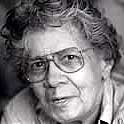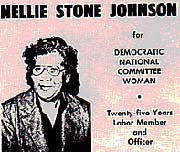By Brandt Williams
Minnesota Public Radio
April 3, 2002
Friends and colleagues of Minnesota civil rights pioneer Nellie Stone Johnson are mourning her death and remembering her lifetime of activism. Johnson, who died Tuesday at the age of 96, spent the majority of her life fighting for social causes. She especially focused on the rights of labor unions, African-Americans and women. Johnson was involved in many struggles and had many accomplishments. Those who knew her say that's a testament to her passion for equality.
| |
|
|
|
||
Nellie Stone Johnson's activism began on the Lakeville farm where she lived with her parents and six brothers and sisters. In a 1995 interview with Minnesota Public Radio, Johnson explained that life on the farm taught her the fundamentals of organizing and negotiating.
"That was kind of in my mind anyhow - and drilled into me - because my folks had organized the family farm around all those issues - the price of milk, the price of potatoes," Johnson said.
Both of Johnson's parents were active members of the Farmer-Labor Party. Her father, William Allen, was her biggest role model. Allen was a member of the local school board and helped form a milk cooperative, which eventually became Land O' Lakes dairy. As a girl, Johnson helped her father by delivering union leaflets by horseback.
"She saw him as a huge inspiration," says Minneapolis writer David Brauer, who helped edit and organize a book about Johnson's life. The book, Nellie Stone Johnson: The Life of an Activist, was published in 2000.
"He was a big reason for why she did what she did," says Brauer, referring to Johnson's father. "I think psychologically, wanting to please the old man or live up to the old man had a lot to do with how she lived the rest of her life."
|
"That whole generation of politicians - including myself, Hubert Humphrey and so many of them - would all say that they owe a great deal of their success to Nellie."
- Former Vice President Walter Mondale |
As a teenager, Johnson organized her fellow workers at the Minneapolis Athletic Club after management cut their wages. Johnson was an elevator operator making $15 per week. The pay cut left her with $12.50 per week. Johnson said the union helped improve conditions for the workers. But she said the experience also helped her realize that much more needed to be done.
"I had seen so much of people in the black community not being able to get jobs, basically because they were black. And I didn't know the fundamentals of that like I know now, but I knew there was something wrong," Johnson said in the 1995 MPR interview. "And when people talked about equality, people having a job or having an education or being able to work - this really got to me."
In the 1930s, Johnson expanded the scope of her activism by associating with other powerful people and organizations. In 1934 she joined the Minneapolis NAACP, and in 1938 she met Hubert H. Humphrey.
In Humphrey, Johnson found a kindred spirit. Humphrey was in the early stages of his political career and was a vocal advocate for equal rights for blacks and women. Humphrey was elected mayor of Minneapolis in 1943.
Two years later, Johnson became the first African-American to hold an elected office in Minneapolis when she was elected to the library board.
Johnson said despite her efforts to unify working class people of all races, racism in Minneapolis still kept people apart.
Longtime residents of Minneapolis say African-Americans frequently faced hostility when they traveled to northeast Minneapolis. They say the working class European immigrants who lived there didn't like blacks, so many stayed away.
But northeast Minneapolis was a labor stronghold, and Johnson needed their votes to help her win the race for the library board.
"Northeast Minneapolis was tightly organized into labor. Even some of my relatives who lived in north Minneapolis said, 'Don't you dare go to northeast Minneapolis.' They didn't say, '(They'll) eat you alive,' but it was pretty close to that. A lot of Italian people, Polish people where there, and a smattering of whatever else. And so - I went, I went on foot," Johnson recalled.
| |
|
|
|
||
It was also during the 1940s when Johnson and Humphrey worked to bring the Farmer-Labor Party and the Democratic Party together to form the DFL.
"She was one of the true leaders of this basic change in Minnesota, that made us a DFL state for many, many years," says former Vice President Walter Mondale. "That whole generation of politicians, including myself, Hubert Humphrey and so many of them, would all say that they owe a great deal of their success to Nellie."
As vice president, Mondale took Johnson with him as an advisor on a diplomatic trip to West Africa. Johnson has also served as advisor and mentor to many other leaders, including former Minneapolis Mayor Don Fraser, former Gov. Rudy Perpich, current U.S. Sen. Paul Wellstone and longtime civil rights activist Matt Little.
Little says when he came to Minnesota from the south in 1948, Johnson helped him understand the nature of northern racism. He says she also told him that the best way to fight racism was to focus on economic empowerment.
"She felt that if we could gain the economic equality, that would transcend the other (issues) - regardless of how people felt about us," says Little. "If we could gain that, then the others would fall into place."
Little says Johnson was an effective activist because she was tenacious, but mild-mannered. Mondale says Johnson carried herself in a way that commanded respect, even from those who disagreed with her.
"The smile, the humor, this engaged way that she tried to change things - it carried with it a spirit that helped her win," Mondale says. "There was no sense of defeatism, there was no doubt, there was no questioning about her right be a full American - and it showed."
Johnson received many honors over her long career. A Minneapolis school has been named for her. A scholarship fund in her name has been providing access to higher education for youth since 1987.
There are also suggestions for commemorative statues being erected in her honor at the Capitol and the new Minneapolis Public Library.
More Information

